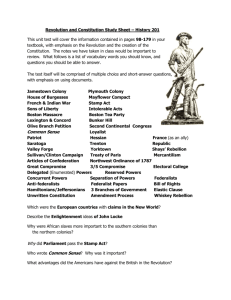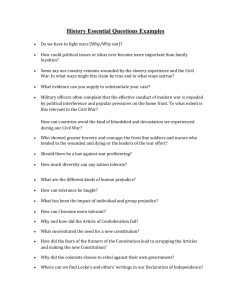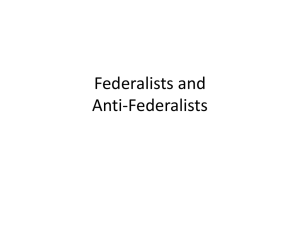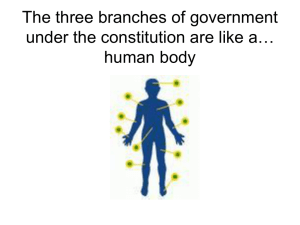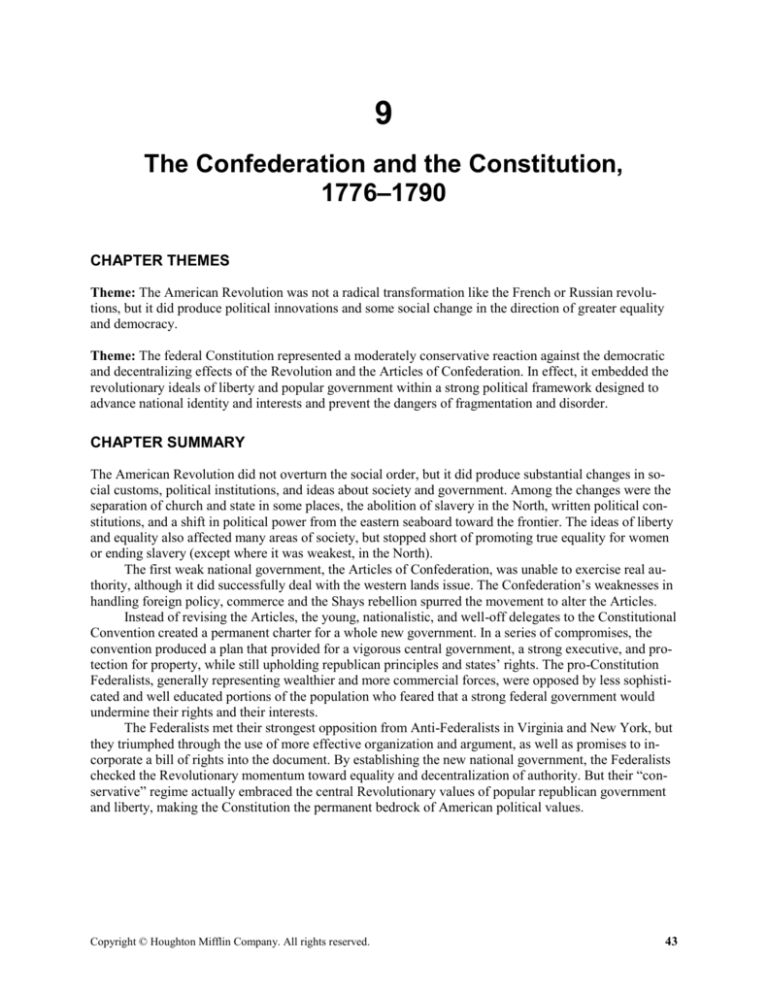
9
The Confederation and the Constitution,
1776–1790
CHAPTER THEMES
Theme: The American Revolution was not a radical transformation like the French or Russian revolutions, but it did produce political innovations and some social change in the direction of greater equality
and democracy.
Theme: The federal Constitution represented a moderately conservative reaction against the democratic
and decentralizing effects of the Revolution and the Articles of Confederation. In effect, it embedded the
revolutionary ideals of liberty and popular government within a strong political framework designed to
advance national identity and interests and prevent the dangers of fragmentation and disorder.
CHAPTER SUMMARY
The American Revolution did not overturn the social order, but it did produce substantial changes in social customs, political institutions, and ideas about society and government. Among the changes were the
separation of church and state in some places, the abolition of slavery in the North, written political constitutions, and a shift in political power from the eastern seaboard toward the frontier. The ideas of liberty
and equality also affected many areas of society, but stopped short of promoting true equality for women
or ending slavery (except where it was weakest, in the North).
The first weak national government, the Articles of Confederation, was unable to exercise real authority, although it did successfully deal with the western lands issue. The Confederation’s weaknesses in
handling foreign policy, commerce and the Shays rebellion spurred the movement to alter the Articles.
Instead of revising the Articles, the young, nationalistic, and well-off delegates to the Constitutional
Convention created a permanent charter for a whole new government. In a series of compromises, the
convention produced a plan that provided for a vigorous central government, a strong executive, and protection for property, while still upholding republican principles and states’ rights. The pro-Constitution
Federalists, generally representing wealthier and more commercial forces, were opposed by less sophisticated and well educated portions of the population who feared that a strong federal government would
undermine their rights and their interests.
The Federalists met their strongest opposition from Anti-Federalists in Virginia and New York, but
they triumphed through the use of more effective organization and argument, as well as promises to incorporate a bill of rights into the document. By establishing the new national government, the Federalists
checked the Revolutionary momentum toward equality and decentralization of authority. But their “conservative” regime actually embraced the central Revolutionary values of popular republican government
and liberty, making the Constitution the permanent bedrock of American political values.
Copyright © Houghton Mifflin Company. All rights reserved.
43
44
Chapter 9
DEVELOPING THE CHAPTER: SUGGESTED LECTURE OR DISCUSSION TOPICS
Consider the social changes brought about by the Revolution. Consider specific changes such as
church-state separation in Virginia and the abolition of slavery in the North in relation to the Revolution’s larger social significance.
REFERENCE:
Gordon Wood, The Radicalism of the American Revolution (1991).
Analyze the structure and workings of the Articles of Confederation government, perhaps using the
table on text page 181. Emphasis might be placed on the achievements of the Articles government,
such as the western lands issue, as well as its obvious weaknesses.
REFERENCE: Jack N.
Rakove, The Beginnings of National Politics (1979).
Address directly the “Beard interpretation” of the Constitution as a conservative counterrevolution
by the propertied elite. Explain the elements of the pro-Constitution movement that support such a
view as well as its limits.
REFERENCES:
Charles Beard, An Economic Interpretation of the Constitution (1913); Robert
Brown, Charles Beard and the Constitution (1956); Edmund S. Morgan, Inventing the People
(1988).
Describe the ratification struggle as both a hard-fought political contest and a great political debate
about the nature of humanity and the purposes of government. Consider particularly the key arguments of the Anti-Federalists, and what might or might not have been legitimate concerns of these
historical “losers” (while remembering that the Bill of Rights is in effect a part of their legacy.)
REFERENCE:
Herbert J. Storing, What the Anti-Federalists Were For (1981).
FOR FURTHER INTEREST: ADDITIONAL CLASS TOPICS
Discuss the question of how revolutionary the Revolution was, measured by the social changes it
caused. One issue might be why Americans have tended to think of the Revolution more in terms of
liberty and political ideas than in terms of social change.
Compare the difficulties of establishing a stable government in post-Revolutionary America with
similar situations in other “new nations” of the modern world.
Consider how America and American government would be different if the Articles of Confederation had remained the national government. One focus might be the extent to which the concept of
“the United States government” is identified with the government of the Constitution.
Discuss the reverence accorded the Constitution and the Founding Fathers in relation to the actual
historical events of 1787. Examine particular provisions of the Constitution, and discuss whether
they might have meant something different in the eighteenth century than they do today.
Examine the treatment of race and slavery in the Constitutional Convention (including how and
why it was mostly but not completely avoided in the actual text). Consider the question of whether
directly addressing the slavery question would have made the creation of a federal union impossible—and perhaps even led to the creation of a separate pro-slavery confederation in 1787.
Copyright © Houghton Mifflin Company. All rights reserved.
The Confederation and the Constitution, 1776—1790
45
CHARACTER SKETCHES
Daniel Shays (1747–1825)
Shays was the Massachusetts Revolutionary War veteran whose rebellion in 1786 spurred the movement
for a new Constitution.
A militiaman at both Lexington and Bunker Hill, Shays was typical of the ordinary Revolutionaryera Americans who left their farms to fight in the War for Independence. He rose to captain and after the
war was elected to various local offices.
Shays emerged as the leader of the revolt by indebted farmers when eight hundred armed men prevented a Springfield court from hearing foreclosure cases. He continually insisted that the farmers wanted
only redress of grievances, not violence, but by early 1787 he was preparing to attack a state arsenal. The
attack failed, and Shays fled to Vermont. He was condemned to death but pardoned the next year, and
eventually he returned to Massachusetts to live out his days in peace.
Quote: “The people assembled in arms…return for answer that, however unjustifiable the measure may
be which the people have adopted in recourse to arms, various circumstances have induced them thereto.…That virtue which truly characterizes the citizens of a republican government hath hitherto marked
our plans with a degree of innocence, and we wish and trust it will still be the case.” (Reply to Gen. Benjamin Lincoln’s demand for surrender, 1787)
REFERENCE:
David Szatmoy, Shays’s Rebellion (1980).
James Madison (1750–1836)
Madison, the “Father of the Constitution,” is generally considered the most original political thinker
among the Founding Fathers. The only failure during his long career of public service was his term as
president, which included the near-disastrous War of 1812.
Madison attended Princeton and considered entering the ministry. He strongly disliked religious
intolerance, and his first political activities were on behalf of religious disestablishment in Virginia.
Throughout his life he kept extensive journals, and his notes on the proceedings of the secret Constitutional Convention provide the only detailed record of the arguments there.
Madison’s marriage to Dolley Payne Todd was a long and happy one. Since Jefferson was a widower, the Madisons’ home was the social center of Washington during both the Jefferson and the Madison administrations. Although quiet, bookish, and introspective, Madison was personally warm and
engaging, especially in intimate settings.
Quote: “Hearken not to the unnatural voice which tells you that the people of America, knit together as
they are by so many cords of affection, can no longer…be fellow-citizens of one great, respectable, and
flourishing empire, Hearken not to the voice which petulantly tells you that the form of government recommended for your adoption is a novelty in the political world.…If novelties are to be shunned, believe
me, the most alarming of all novelties, the most wild of all projects, the most rash of all attempts, is that
of rending us in pieces, in order to preserve our liberties and promote our happiness.” (Federalist No. 14,
1788)
REFERENCE:
Irving Brant, The Fourth President: A Life of James Madison (1970).
Copyright © Houghton Mifflin Company. All rights reserved.
46
Chapter 9
Patrick Henry (1736–1799)
Henry was the famous Revolutionary orator and five-term Virginia governor who later became the leading Anti-Federalist opponent of the Constitution.
He came from a plain frontier background rather than from the planter aristocracy. When his uncle
took him to hear Samuel Davies, a famous Great Awakening preacher, young Patrick fell in love with the
art of persuasive speaking.
Henry’s eloquent defenses of Virginia liberty at the time of the Stamp Act made him the youthful
leader of the radical party in that state. He made his “give me liberty or give me death!” speech during the
debate over whether the Virginia assembly should take steps toward independence.
Henry’s young protégé Thomas Jefferson succeeded him as governor during the Revolution, but
Henry later demanded an investigation of Jefferson’s conduct in office that caused a bitter and lasting
feud between the two. In his later years Henry was plagued with financial troubles and became increasingly conservative.
Quote: “It is now confessed that this is a national government.…The means, says the gentleman, must be
commensurate to the end. How does this apply? All things in common are left with this government.
There being an infinitude in the government, there must be an infinitude of means to carry it out.” (Virginia debate on the Constitution, 1788)
REFERENCE:
Richard R. Beeman, Patrick Henry (1974).
GREAT DEBATES IN AMERICAN HISTORY
GREAT DEBATE (1787–1789): The Constitution: Should the United States adopt the new Constitution
to replace the Articles of Confederation?
For: The Federalists—led by Washington,
Hamilton, Madison, Jay, and Marshall; including most commercial, seacoast, urban,
and upper-class groups.
Against: The Anti-Federalists—led by Patrick
Henry, Samuel Adams, Richard Henry Lee,
George Mason, and George Clinton; including
many noncommercial, western, agrarian, and
state-oriented interests.
ISSUE #1: Need for change. Does the government of the Articles need to be replaced?
Yes: Federalist Alexander Hamilton: “The
faith, the reputation, the peace of the whole
Union are thus continually at the mercy, the
prejudices, the passions, and the interests of
every member of which it is composed. Is it
possible that foreign nations can either respect
or confide in such a government? Is it possible that the people of America will longer
consent to trust their honor, their happiness,
their safety, on so precarious a foundation?…The Confederation…is a system so
radically vicious and unsound, as to admit not
of amendment but by an entire change in its
leading features and characters.”
No: Anti-Federalist Patrick Henry: “The honorable gentleman said that great danger would
ensue if the Convention rose without adopting
this system. I ask, where is that danger? I see
none. Other gentlemen have told us, within
these walls, that the union is gone, or that the
union will be gone.…Till they tell us the
grounds of their fears, I will consider them as
imaginary.…Where is the danger? If, sir,
there was any, I would recur to the American
spirit which has enabled us to surmount the
greatest difficulties.”
Copyright © Houghton Mifflin Company. All rights reserved.
The Confederation and the Constitution, 1776—1790
ISSUE #2: Can a republic govern a large territory and a diverse population?
Yes: Federalist James Madison: “Extend the
sphere, and you take in a greater variety of
parties and interests; you make it less probable that the majority of the whole will have a
common motive to invade the rights of other
citizens.…Hence, it clearly appears that the
same advantage which a republic has over a
democracy, in controlling the effects of faction, is enjoyed by a large over a small republic.…”
No: Anti-Federalist James Winthrop of Massachusetts: “It is the opinion of the ablest
writers on the subject, that no extensive empire can be governed on republican principles,
and that such a government will degenerate to
a despotism.…No instance can be found of
any free government of any considerable extent.…Large and consolidated empires may
indeed dazzle the eyes of a distant spectator
with their splendour, but if examined more
nearly are always found to be full of misery.”
ISSUE #3: Will the new constitutional government create an aristocratic power in the presidency?
No: Federalist Alexander Hamilton: “There is
no comparison between the intended power of
the President and the actual power of the British sovereign.…The President of the United
States would be an officer elected by the people for four years; the king of Great Britain is
a perpetual and hereditary prince.…What answer shall we give to those who would persuade us that things so unlike resemble each
other? The same that ought to be given to
those who tell us that a government, the whole
power of which would be in the hands of the
elective and periodical servants of the people,
is an aristocracy, a monarchy and a despotism.”
Yes: Anti-Federalist George Clinton of New
York: “Wherein does this president, invested
with his powers and prerogatives, essentially
differ from the king of Great Britain (save as
to the name, the creation of nobility and some
immaterial incidents…)? The safety of the
people in a republic depends on the share or
proportion they have in the government; but
experience ought to teach you, that when a
man is at the head of an elective government
invested with great powers, and interested in
his reelection…appointments will be made by
which means an imperfect aristocracy bordering on monarchy may be established.”
ISSUE #4: Does the proposed Constitution protect the people’s liberty?
Yes: Federalist Alexander Hamilton: “Here, in
strictness, the people surrender nothing; and
as they retain everything they have no need of
particular reservations.…Bills of rights, in the
sense and to the extent in which they are contended for, are not only unnecessary in the
proposed Constitution, but would even be
dangerous.…Why declare that things not be
done which there is no power to do?…the
truth is…that the Constitution is itself, in every rational sense, and to every useful purpose,
a BILL OF RIGHTS.”
Copyright © Houghton Mifflin Company. All rights reserved.
No: Anti-Federalist George Mason of Virginia: “There is no declaration of rights: and the
laws of the general government being paramount to the laws and constitutions of the
several states, the declarations of rights, in the
separate states, are no security. Nor are the
people secured even in the enjoyment of the
benefit of the common law, which stands here
upon no other foundations than its having
been adopted by the respective acts forming
the constitutions of the several states.”
47
48
Chapter 9
REFERENCES:
Gordon Wood, The Creation of the American Republic, 1776–1787 (1969); Thorton Anderson, Creating the Constitution (1993).
QUESTIONS FOR CLASS DISCUSSION
1. Which of the social changes brought about by the Revolution was the most significant? Could the
Revolution have gone further toward the principle that “all men are created equal” by ending slavery
or granting women’s rights?
2. Was the United States in a crisis under the Articles of Confederation, or was the “crisis” exaggerated
by the Federalists to justify their movement? Could the United States have survived if the Articles
had stayed in effect?
3. Should the Founding Fathers’ general elitism and indifference to the rights of people, women, African-Americans, and Indians be held against them? Or should they be viewed with more understanding
in their historical context?
4. What was really at stake in the debate between Federalists and Anti-Federalists? Did the Federalists
win primarily because of their superior political skills or because they had a clearer view of the meaning of the Revolution and the future of the United States?
EXPANDING THE “VARYING VIEWPOINTS”
Charles Beard, An Economic Interpretation of the Constitution (1913).
A view of the Constitution as a conservative “counterrevolution”:
“The concept of the Constitution as a piece of abstract legislation reflecting no group interests and
recognizing no economic antagonisms is entirely false. It was an economic document drawn with
superb skill by men whose property interests were immediately at stake; and as such it appealed directly and unerringly to identical interests in the country at large.”
Gordon Wood, The Creation of the American Republic (1969).
A view of the Constitution as the extension of republican political theory:
“Because new ideas had grown often imperceptibly out of the familiar, the arguments the federalists
used in 1787–88 never really seemed disruptive or discontinuous. Americans had been prepared for
a mighty transformation of political thought by a century and half of political experience telescoped
into the rapid intellectual changes that had taken place in the three decades of the Revolutionary
era.…Americans had destroyed the age-old conception of mixed government and had found new
explanations for their policies created in 1776, explanations that rested on their expansion of the
principle of representation. America had not discovered the idea of representation, said Madison,
but it could ‘claim the merit of making the discovery the basis of unmixed and extensive republics.’ ”
Copyright © Houghton Mifflin Company. All rights reserved.
The Confederation and the Constitution, 1776—1790
49
QUESTIONS ABOUT THE “VARYING VIEWPOINTS”
1. Why was Beard’s view of the Constitution and the Founding Fathers so shocking when it first appeared? What would be the implications if Beard were correct?
2. Does Wood’s view fit Beard’s critique of those who see the Constitution as “a piece of abstract legislation reflecting no group interests”? What would Wood see as the “interests” of the Founding Fathers?
3. How would the holder of each of these views understand the relationship between the Revolution and
the Constitution? How would each of them interpret the Anti-Federalists?
Copyright © Houghton Mifflin Company. All rights reserved.

